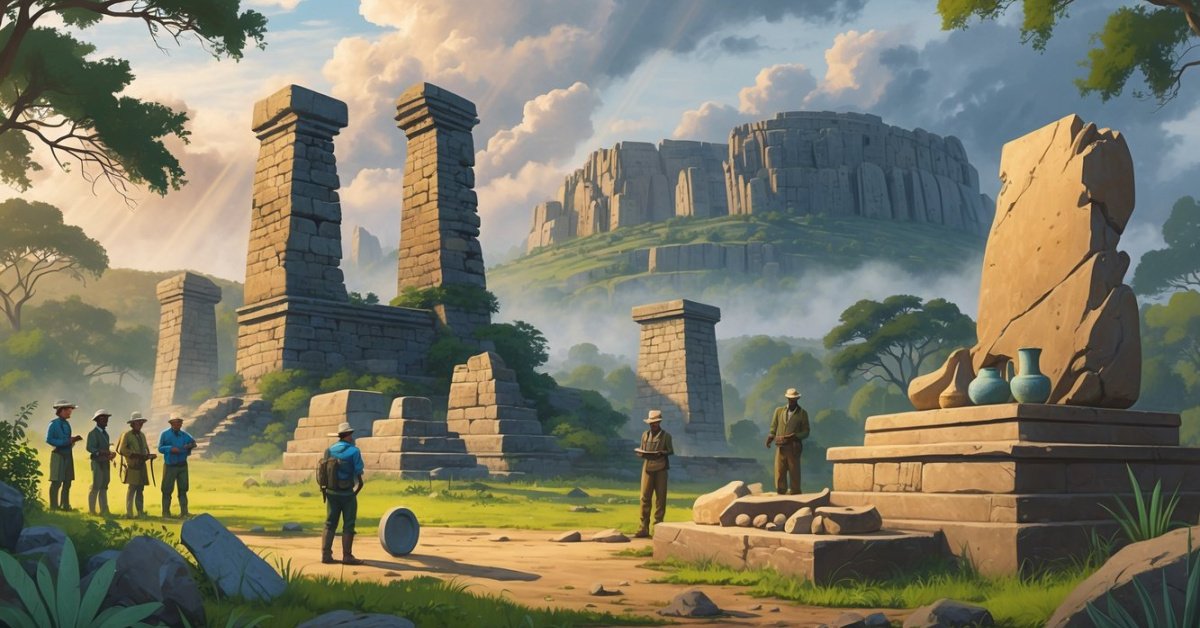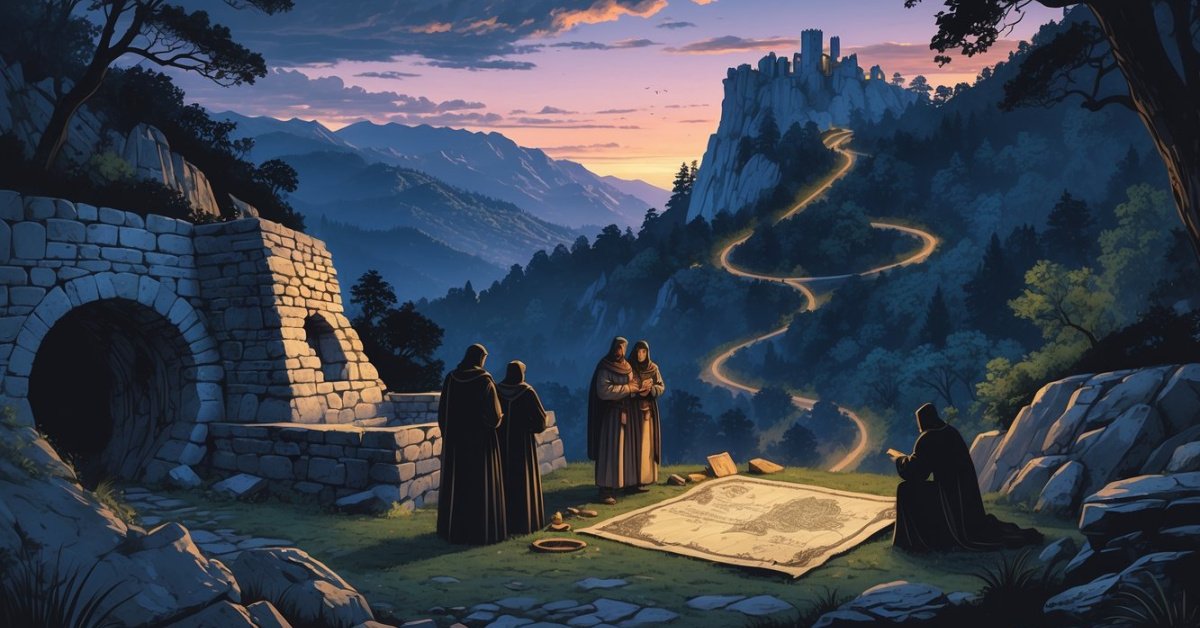Ghana is full of mysterious stories, hidden places, and ancient artifacts that continue to puzzle historians and locals alike. From strange clay figurines uncovered by archaeologists to the legendary Komfo Anokye Sword that nobody can move, these mysteries draw people from all over the world.
Each has its own story, connecting modern life with Ghana’s rich past.
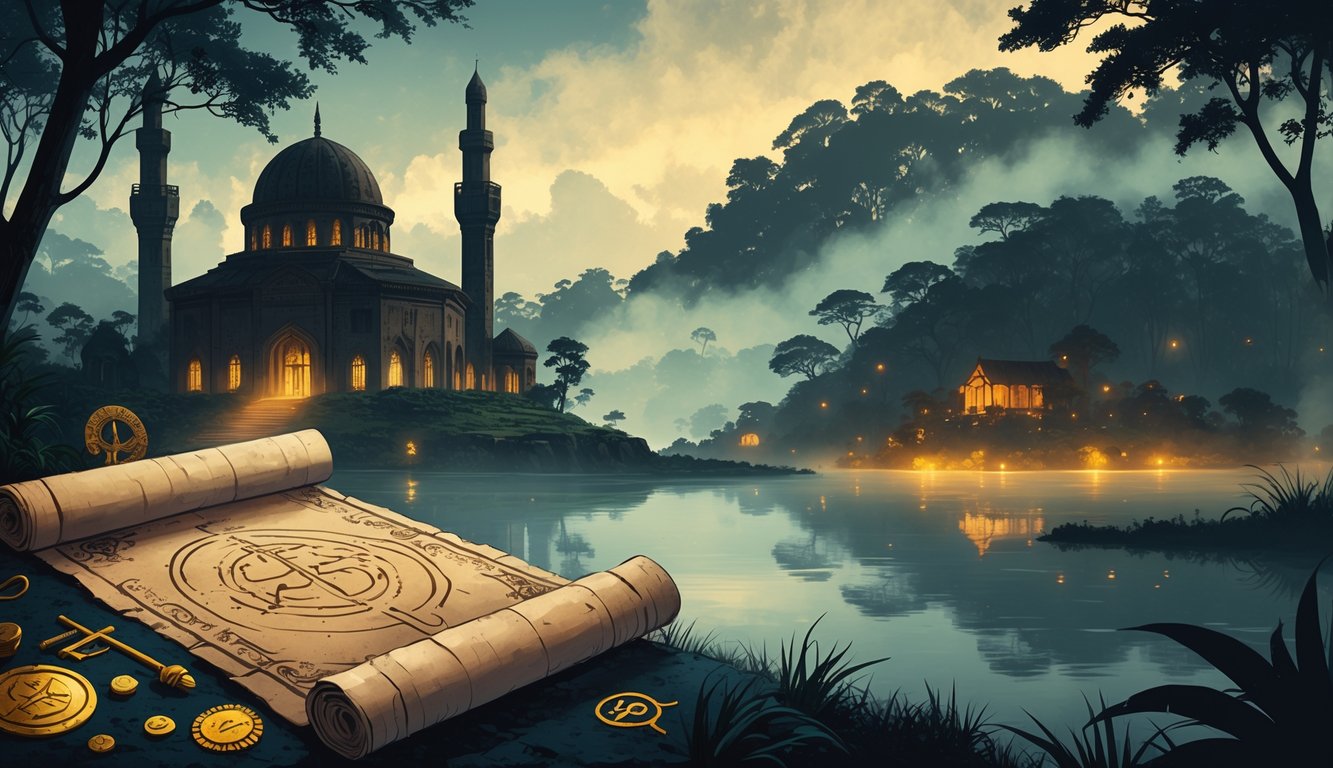
Some puzzles are still waiting for answers. For example, little is known about the true purpose of the ancient clay figures recently displayed outside Ghana for the first time.
Experts and visitors remain curious about their meaning and origin. Other mystery sites, like old shrines and ruins, are important stops for anyone wanting to discover Ghana’s hidden gems and ancient secrets.
Whether it’s a lost civilization, a famous unsolved case like the Accra Strangler, or the burial traditions of kings, Ghana’s biggest historical mysteries encourage everyone to look closer at the nation’s past.
A Historical Overview of Ghana’s Greatest Mysteries
Ghana has a rich history, and some events have puzzled experts and locals for decades. These mysteries include missing artifacts, unsolved crimes, and lost secrets from ancient kingdoms.
Defining Historical Mysteries in Ghana
Historical mysteries in Ghana are events or incidents from the past that people have not fully explained or understood. They can include the disappearance of people, unexplained deaths, missing royal treasures, or forgotten sites.
One example involves the lost regalia of the Ashanti Kingdom. Another is the fate of artifacts taken during colonial times.
Some mysteries are political, like unexplained assassinations or coups that still raise doubts. Others are cultural, connected to oral histories or ancient ruins whose stories remain hidden.
Unsolved mysteries often combine facts, legends, and rumors. This mix makes them difficult to investigate with certainty.
Researchers use records, interviews, and archaeological evidence to find answers. However, they often hit dead ends because of missing documents or eyewitnesses.
Timeline of Major Unresolved Cases
| Year | Event | Details |
|---|---|---|
| 1874 | Sacking of Kumasi | Ashanti Golden Stool and treasures taken, some never found |
| 1948 | Death of the Big Six leaders | Causes and details unclear, fueling speculation |
| 1966 | Coup d’état against Kwame Nkrumah | Motivations and roles debated |
| 1972 | Mystery of Yaa Asantewaa’s missing regalia | Lost during conflicts, still unlocated |
| 1980s | Vanishing of ancient manuscripts in Timbuktu | Some were traded or lost through Ghanaian trade routes |
Items looted during the colonial era, like the Golden Stool, are still missing. Some remain hidden in private collections or have disappeared.
Other cases, like the disappearance of leaders or royal symbols, have shaped national debates and history books.
Cultural Impact of Unsolved Mysteries
Unexplained events play a major role in Ghana’s culture. Stories of unsolved mysteries are often shared in schools, family gatherings, and festivals.
These stories keep traditions alive by connecting new generations to the past. Literature and the arts draw inspiration from these riddles.
Ghanaian mystery novels, such as the celebrated Darko Dawson Mysteries, take clues from historical puzzles. Folk tales and songs also echo unsolved stories, blending fact and myth.
Communities sometimes organize searches or ceremonies to honor those lost or missing. These events foster unity and encourage learning about local history.
Mysterious Murders That Shook Ghana
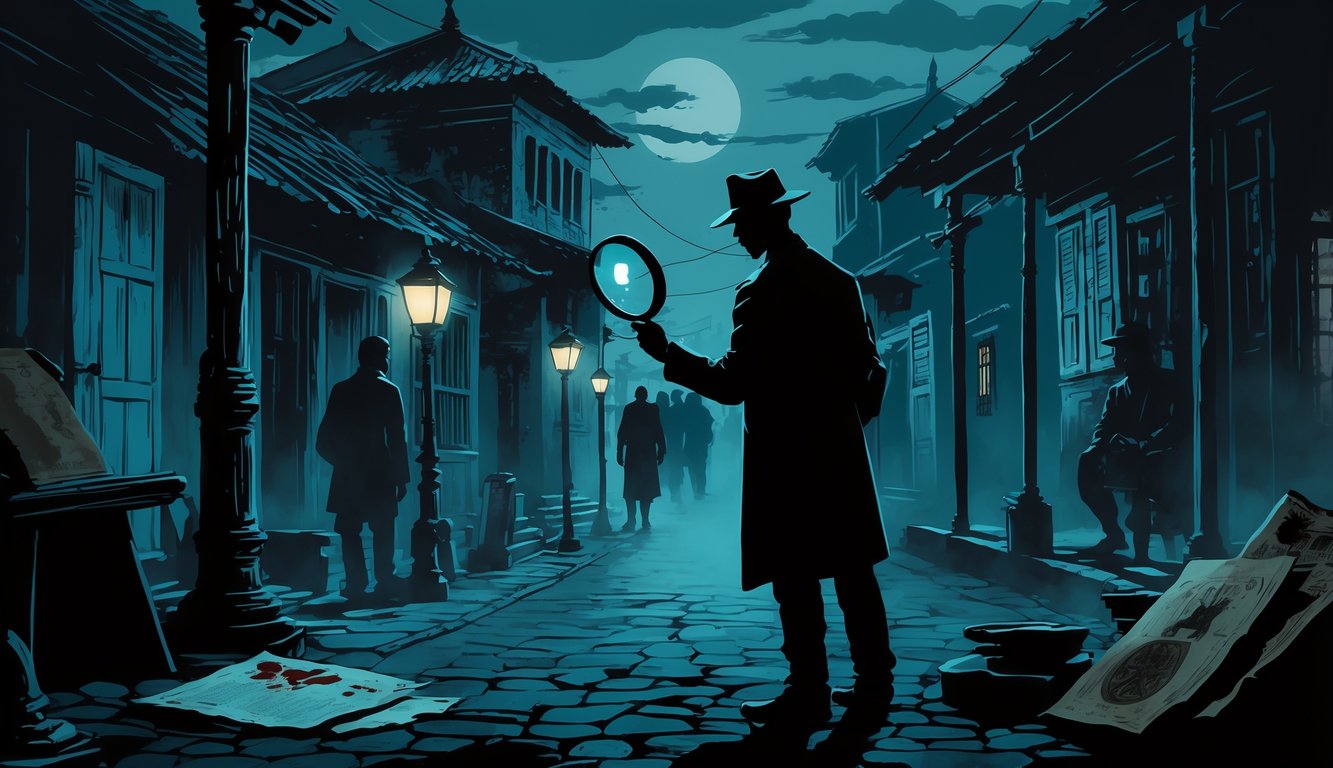
Ghana has faced chilling murder mysteries that have never been fully solved. These cases have left deep scars on communities and started many debates about justice and security.
Notorious Murder Cases and Their Legacy
One of Ghana’s most shocking cases happened in 1982, when kidnappers took three high court judges and a retired army officer from their homes at night. The victims were later found murdered at the Bundase military shooting range.
This crime created a national crisis and caused panic. Authorities formed a Special Investigations Board to look into the case.
Some suspects were convicted, but many people still feel there are questions that remain unanswered. The story of the 1982 murders can be explored more on the events surrounding the murder of Ghanaian judges.
Political and high-profile murders have also raised concerns over corruption and power struggles. Some families and activists continue to seek the truth behind these events.
Unsolved Serial Killer Incidents
Serial killings are rare in Ghana, but one case stands out. In Accra, a string of murders created fears about a possible serial killer called the “Accra Strangler.”
Victims were mostly women, and the pattern of deaths confused both the police and the public. Investigators struggled with limited forensic resources, and the killer was never caught.
The idea of an unknown murderer operating in the city spread a wave of distrust and fear. Even years later, the question of the Accra Strangler lingers, leaving this serial killing incident in Ghana a mystery.
This chilling episode made people think more about safety and community vigilance.
Ghana’s Most Talked About Murder Mystery
Some murder cases in Ghana become national conversations because no one can solve them. The deaths of certain public figures and the shocking nature of their cases fuel discussions on radio, TV, and social media.
The murder of a traditional leader or a public servant often attracts attention that lasts for years. Investigations sometimes lead to arrests, but in other cases, evidence goes missing or trials stall.
The justice system often comes under a spotlight, with families demanding answers. Lists of unsolved high-profile murder cases in Ghana keep growing.
The Enigma of Accra’s Greatest Unsolved Crimes
Accra has seen puzzling crimes that have left families searching for answers. The police continue to work hard for justice.
Many of these cases remain open, drawing both national attention and international interest.
High-Profile Accra Mysteries
One of the most talked-about mysteries is the case of the “Accra Strangler,” a series of murders in the early 1990s. Police found several women killed in similar ways across different neighborhoods.
Despite forming special task forces and following leads, the killer avoided arrest for years. International agencies, including the FBI, offered assistance.
The case revealed gaps in police procedural skills and technology at the time. This led to new efforts to train investigators and modernize crime fighting.
People in Accra followed the story closely, hoping each new headline would bring closure. Another notable case is the assassination of a well-known investigator from Tiger PI in Adenta.
His murder brought fears about threats to journalists and those exposing crime. The public demanded better safety and thorough investigations, making it a turning point in discussions about press freedom and law enforcement response.
Most Infamous Crime Scenes in Accra
Some crime scenes in Accra are remembered for their shock and the questions they raised. The Mataheko neighborhood became linked to several unsolved murders, creating fear in the local community.
This sparked debates about police patrols and neighborhood safety. Adenta, another suburb, stands out because it was where the Tiger PI investigator lost his life.
Local police cordoned off the scene for days and interviewed witnesses, but clear answers still did not emerge. Concern grew about how quickly and effectively crimes were handled.
Accra’s most infamous crime scenes show the challenges facing investigators, from limited resources to the need for better training. Calls for teamwork between Ghanaian police and international agencies became louder.
Learn more about these cases and their lasting impact on Accra at Africa’s Greatest Unsolved Murders and see why the Mataheko Murders remain so memorable at GhPage’s article.
The Role of Police Procedurals in Solving Mysteries
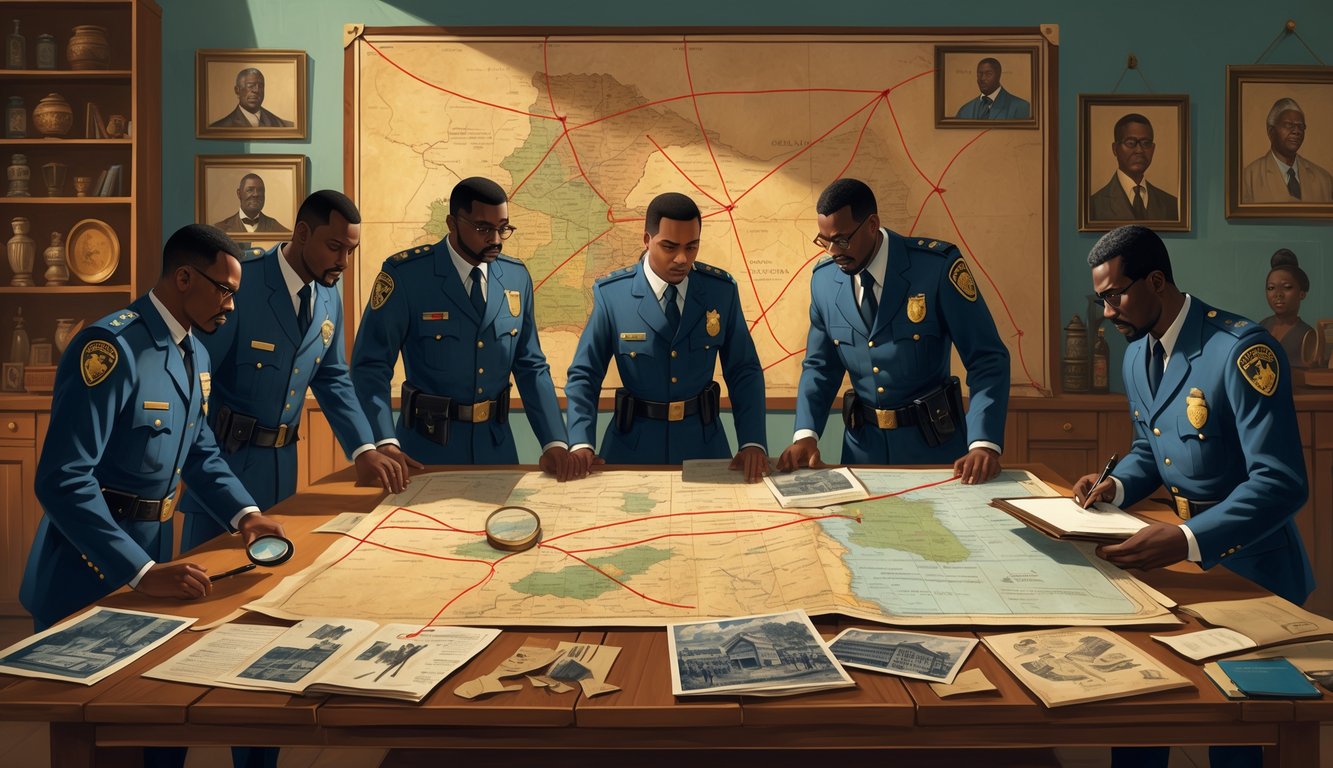
Police procedurals play a big part in real investigations and in stories that show how crimes are solved. These stories and real cases reveal how Ghana’s police forces have grown more skilled over time.
Famous cases can change the way law enforcement works.
Evolution of Law Enforcement Methods
Police procedures have come a long way in Ghana. When police began working in the country, they used simple, traditional tools and based many decisions on local customs.
Over time, new methods like fingerprinting, evidence gathering, and organized detective work started to appear. Today, Ghana’s police use modern tools such as forensic science and computer analysis to help solve crimes.
Technology has made it much easier to catch suspects and find hidden evidence. In large cities, the police now have special divisions for crimes like fraud, homicide, and cybercrime.
Training for officers now includes learning about scientific methods and casework. This growth mirrors changes seen in other countries, where police work is built around procedures, teamwork, and using science to solve mysteries.
For more on the history of police procedurals and their evolution, readers can learn how police work has changed from older systems to modern practices.
Famous Police Procedural Cases
Over the years, Ghana has seen several well-known cases where police procedures played a key role.
| Case Name | Year | Type of Crime | Police Role |
|---|---|---|---|
| The Accra Serial Killer Case | 1980s | Homicide | Use of forensic evidence and witness interviews |
| Kwabenya Jailbreak | 2018 | Prison break | Investigation and nationwide manhunt |
| Takoradi Kidnappings | 2019 | Abductions | Forensic analysis and cooperation with neighboring countries |
These cases showed the value of careful police work. Officers collected and analyzed evidence step by step, interviewed witnesses, and sometimes worked with foreign police.
Modern police procedural stories and real-life cases have inspired changes in both law and the way crimes are handled in Ghana. Details from these high-profile investigations often lead to better methods in training and new technology for local law enforcement.
For more about how police and scientific methods can transform crime solving, see the breakdown in modern police procedurals.
Modern Literary Portrayals of Ghanaian Mysteries
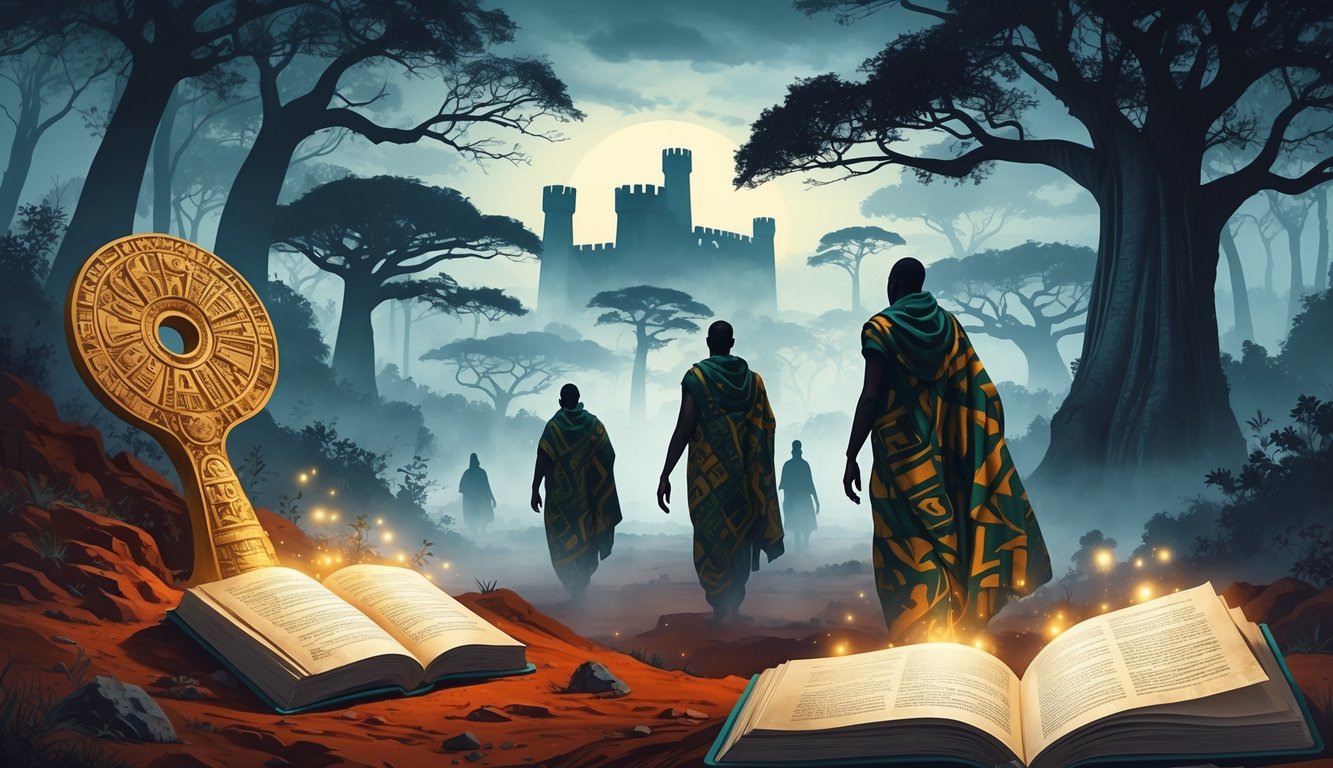
Ghanaian fiction explores hidden truths and unresolved crimes through lively modern stories. These books often mix traditional beliefs and social change with suspenseful mysteries.
Detective Novels Set in Ghana
Detective novels set in Ghana take readers into cities like Accra. Authors like Kwei Quartey create characters who solve cases rooted in local issues.
His books show how tradition, family ties, and rapid development shape crime investigations. Quartey’s lead characters often clash with superstition and corruption.
In “Wife of the Gods,” Detective Darko Dawson faces the custom of giving young women to priests and the dangers that follow. He investigates motives in tight-knit communities while dealing with his own struggles.
Readers see how law enforcement in Ghana handles modern crimes while respecting cultural roots. The books describe daily life, language, and settings in detail, making the mysteries feel real and urgent.
Some of these novels appear in lists like top Ghanaian novels to read.
Popular Mystery and Thriller Series
Mystery and thriller series from Ghanaian writers have become more popular in the last decade. Authors craft suspenseful plots that keep readers guessing.
Kwei Quartey’s Emma Djan series stands out. Emma, a former police detective, becomes a private investigator in Accra.
These books explore crimes like missing persons, kidnappings, and hidden secrets in both city and rural areas. The series mixes action with questions about justice and society.
Emma’s journey gives a fresh view on how women investigate crime in Ghana’s complex culture. Some books also explore themes of betrayal and tradition, creating a mix of ethics, danger, and community ties.
Readers can find more about these books in guides to Ghanaian fiction and mystery stories.
Iconic Ghanaian Detectives in Fiction and Reality
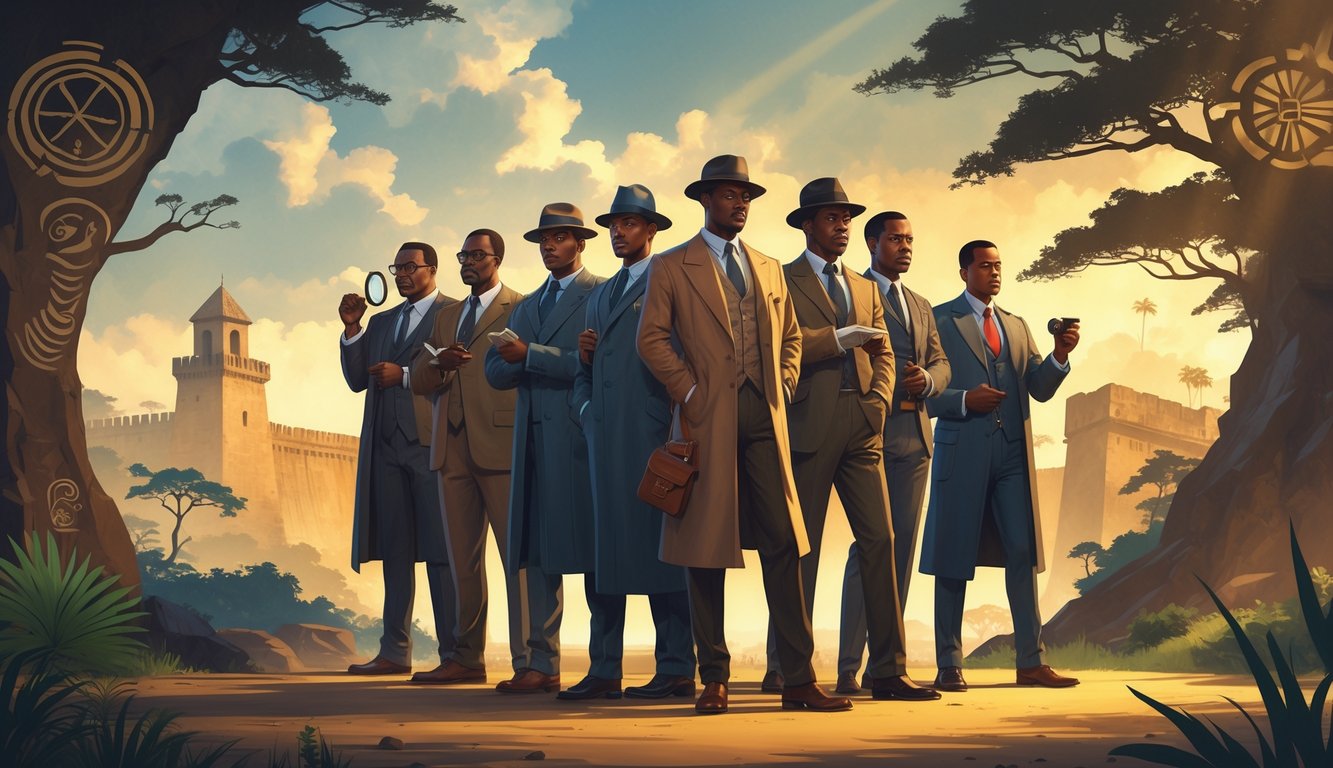
Detective stories in Ghana introduce characters who solve crimes while revealing details about society and culture. Well-known authors have created memorable investigators, and some have become favorites among mystery lovers.
Darko Dawson: Fictional Detective Hero
Darko Dawson is the main character in a detective series by Kwei Quartey. He works as a detective in Accra, Ghana’s capital.
Dawson is known for his sharp observation skills and deep care for the people involved in his cases. The books discuss Ghana’s traditions, daily life, and places.
Dawson faces issues like corruption, family struggles, and modern challenges. Through his perspective, readers see the realities of police work in Ghana and learn about local customs and food.
Many mystery fans appreciate how the Darko Dawson series combines storytelling with real insights into Ghanaian culture. The books appear on many lists of great Ghanaian fiction and mystery novels.
Emma Djan’s Unique Investigative Approach
Emma Djan is another standout detective created by Kwei Quartey. She used to be a police officer in Accra but now works as a private investigator after a painful loss and career setback.
Emma tackles tough cases, such as missing persons and cybercrime. She often faces danger alone and handles difficult investigations with creative thinking and determination.
Her stories explore modern subjects like internet fraud and social issues. Emma Djan’s books show the challenges many people in Ghana face and give a voice to those affected by crime.
The series is praised for its thoughtful look at both Emma’s personal life and Ghana’s changing society. Many readers enjoy how Emma’s approach is different from traditional detectives, making her stories stand out in Ghanaian detective novels.
Literary Landmarks: Mythical Ghanaian Mystery Novels
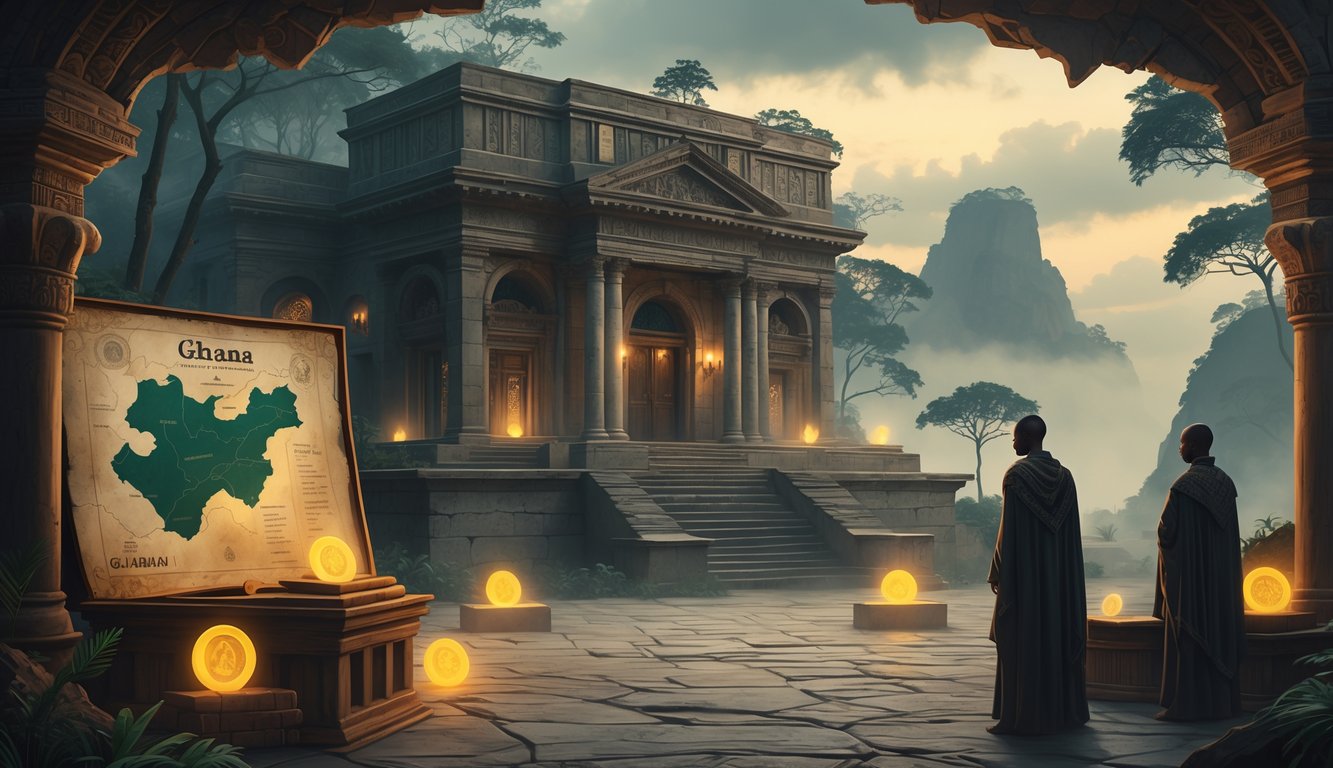
Mystery novels set in Ghana blend suspenseful plots with local culture and unique settings. Kwei Quartey uses traditions and social issues as the backdrop for his stories.
Wife of the Gods: A Ghanaian Masterpiece
Wife of the Gods is the first book in Kwei Quartey’s mystery series. The novel follows Detective Inspector Darko Dawson as he investigates the murder of a young medical student in a rural town.
The case gives readers a view into the family customs, beliefs, and taboos of the region. Dawson must confront criminal suspects and the pressures of tradition and modernity.
He faces secret societies, unexplained deaths, and local resistance to outsiders. Quartey introduces readers to herbal medicine, political dynamics, and superstitions that shape daily life in Ghana.
The story moves quickly and paints a detailed picture of Ghanaian villages. Authentic dialogue and real locations add to the sense of realism.
For those interested in an African setting mixed with local detail, this novel is a strong pick. To find more Ghanaian fiction and mysteries, visit lists like Ghanaian fiction and mystery books.
Sleep Well, My Lady: Suspense Redefined
Sleep Well, My Lady is another standout from Kwei Quartey. The novel centers on the murder of Lady Araba, a high-profile fashion designer in Accra.
Emma Djan, one of the few female private investigators in Ghanaian fiction, leads the case. Emma explores the glamorous but dangerous world of fashion, uncovering secrets about Araba’s relationships and business deals.
Quartey places social issues like gender bias, corruption, and justice at the heart of the story. This keeps the suspense high and the stakes personal.
The investigation moves through city streets, courtrooms, and hidden corners of Accra. Readers follow Emma’s approach as she questions suspects and builds her case.
Sleep Well, My Lady focuses on character motivation as well as solving the mystery. For more novels like this, check out top Ghanaian novels.
Exploring Real-Life Suspenseful Detective Stories
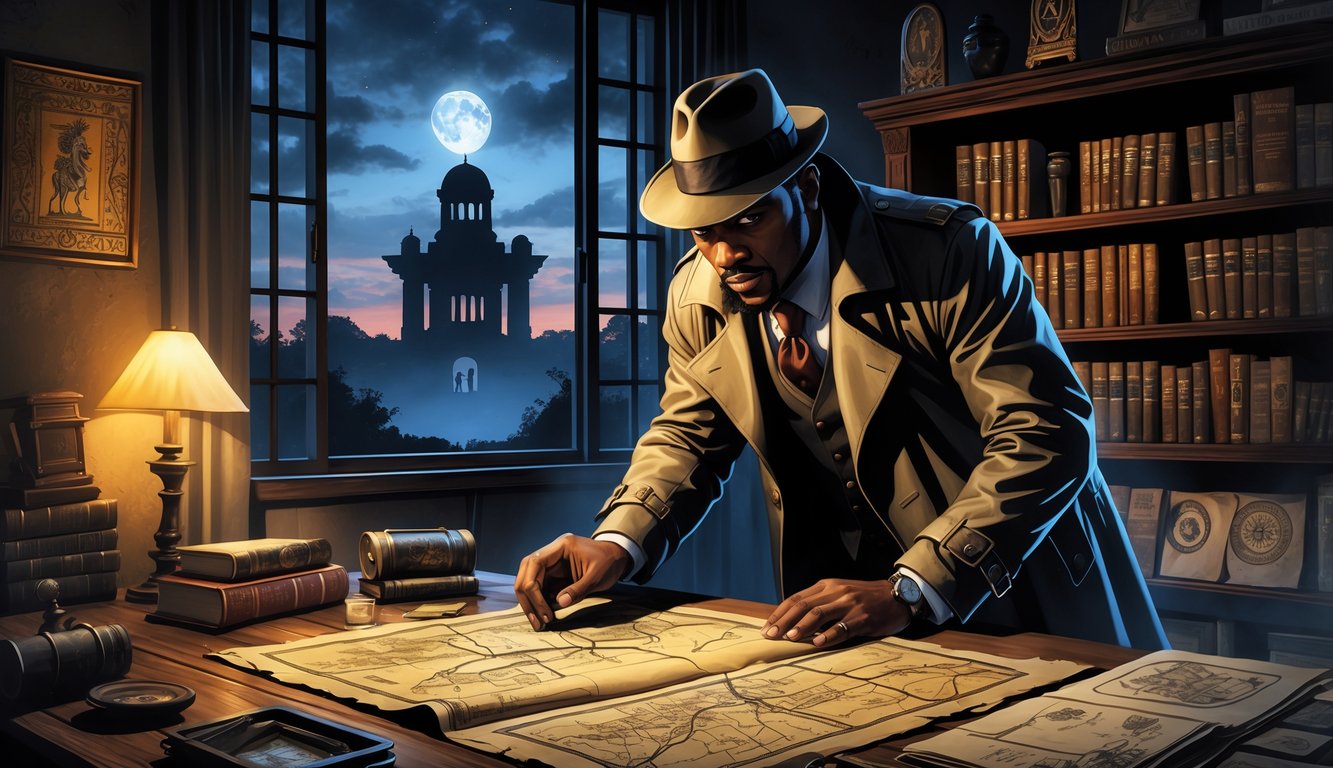
Real detective stories in Ghana show the challenges investigators face and how communities react to unsolved cases. These stories have shaped crime reporting and popular fiction, highlighting the blend of local culture with suspense and detective work.
The Intersection of Fact and Fiction
Ghana’s real-life mysteries, such as unsolved disappearances and historical crimes, often inspire detective novels. Writers blend true stories with fiction, creating characters and settings that feel real.
Famous unsolved cases, full of twists and missing evidence, lay the groundwork for suspenseful plots. In many books, authors use the police procedural approach.
They show the details of law enforcement work, like interviews or crime scene investigations, while adding drama through unreliable witnesses or missing clues. This method helps readers understand how detectives work in Ghana, mixing rules and creativity.
Readers can learn more about real-life cases in articles like Real-Life Detective Stories: Famous Cases and Their Outcomes.
When local legends or headlines mix with fiction, suspense feels closer to home. This connection makes detective stories more interesting and relatable for people in Ghana.
Influence on Ghana’s Detective Genre
Detective stories and real criminal cases have shaped Ghana’s detective genre. Early tales focused on traditional beliefs or folklore, but as police work modernized, stories began to reflect this change.
Writers use real police investigations to show the complexities of modern Ghana, from rural villages to busy cities. These stories use lists, timelines, and even tables to track suspects, evidence, and alibis, making plots feel like true investigations.
Readers enjoy how these novels highlight the tough decisions detectives face. They also learn about local customs, languages, and the justice system.
This link to real events and procedures increases interest in both fiction and true crime. The detective genre has grown in popularity across Ghana, as seen in mystery and suspense writing around the world, like those highlighted by Mystery and Suspense Magazine.
Theories and Speculations Surrounding Unsolved Mysteries
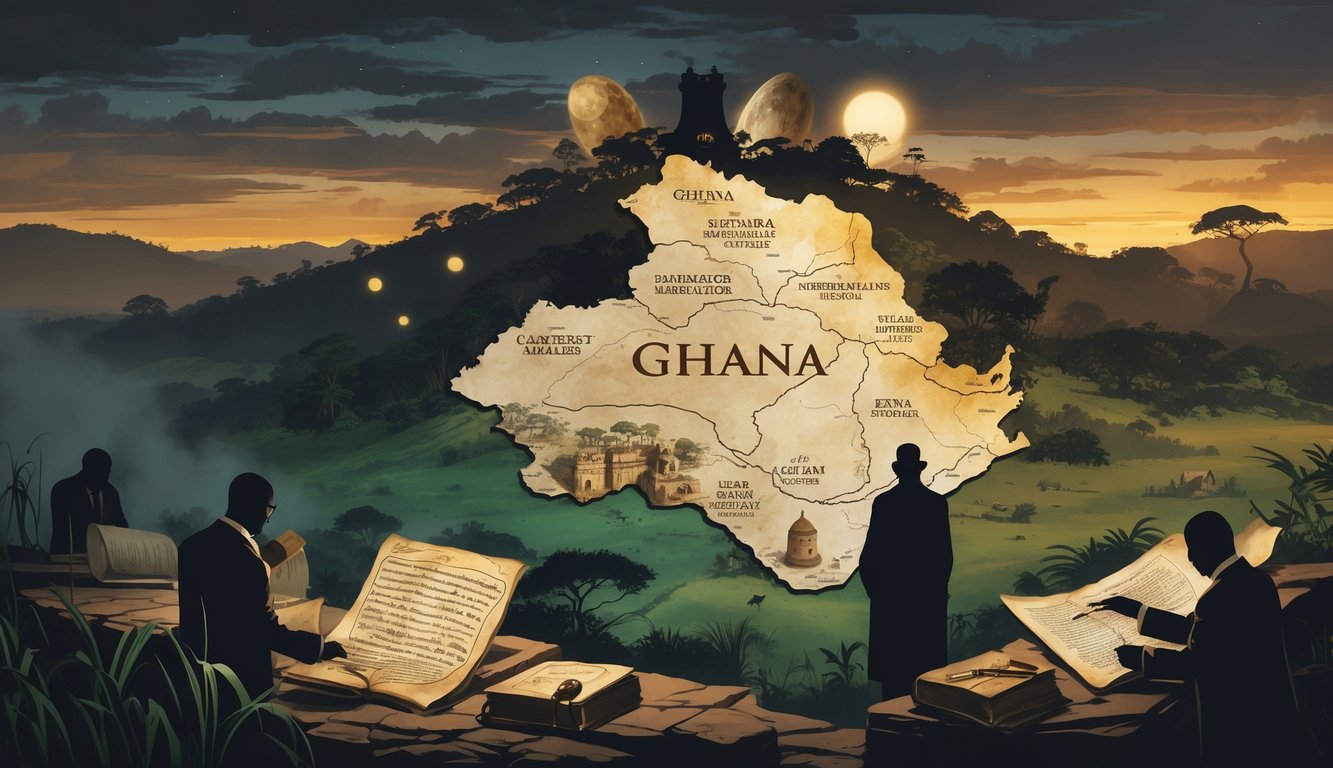
Ghana’s history is full of unanswered questions that spark curiosity. Scholars, locals, and storytellers share different opinions about these secrets.
Most Popular Theories in Ghanaian Folklore
In Ghana, oral tradition keeps many historical mysteries alive. People talk about the lost city of Oboase, which some believe vanished after a curse.
Others point to the mysterious stone circles in the Upper West Region, saying they could be ancient burial grounds or places of worship. The Akan people have stories about gold mines hidden by their ancestors to protect them from invaders.
According to legends, only those chosen by the spirits can find these sites. Folktales also tell of sacred lakes guarding secret treasures, watched over by gods or ancestors.
Local beliefs blend with history, shaping how people interpret gaps in the past. Many families pass down these tales, keeping them alive for each generation.
Contemporary Debates on Historical Mysteries
Researchers and historians debate the origins of Ghana’s mysterious sites and artifacts. Some experts argue that sites like Oboase and the stone circles are the result of migration or natural disasters, not curses or magic.
Archaeologists use new technology, such as ground-penetrating radar, to search for lost settlements and gold mines. Others believe stories about hidden treasures warn people away from dangerous places or explain unknown ruins.
Discussions in universities and online forums compare Ghanaian puzzles to other major historical mysteries in the world. With every new discovery, old theories are questioned, and new ideas appear.
The Continuing Appeal of Unsolved Mysteries in Ghanaian Culture
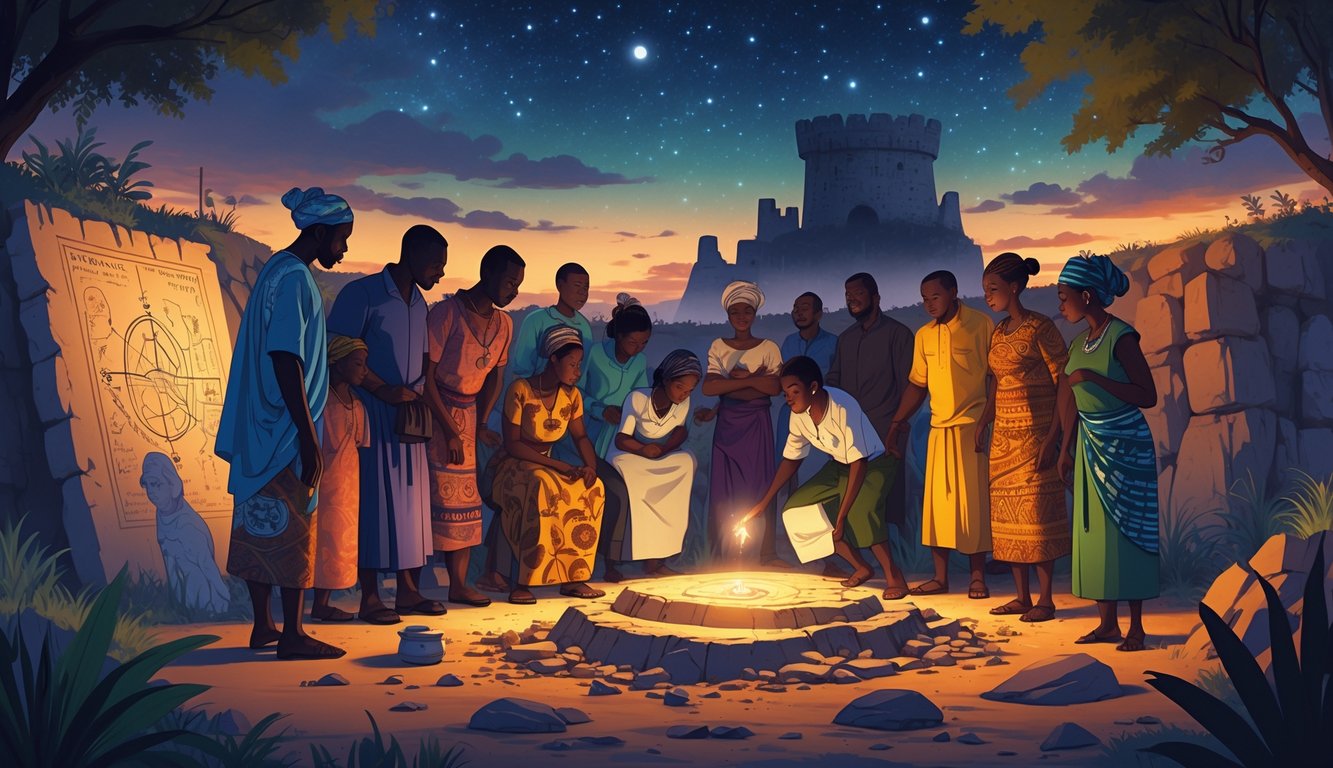
Unsolved mysteries have a lasting impact on daily life in Ghana. These stories connect history and shape cultural traditions.
Why Ghanaians Love a Good Mystery
Many people in Ghana enjoy historical mysteries because these stories link the past to the present. Unsolved cases like the legend of the Accra Strangler or the deaths of famous figures spark curiosity and keep conversations going.
Some families remember these events through storytelling, passing them from one generation to the next. Communities gather to discuss details, share theories, and debate possible solutions.
The love of mystery often becomes a shared experience in both cities and rural areas. For some, these tales are more than stories—they help explain the unknown and cope with unexplained events.
Interest in unsolved mysteries also shows respect for Ghana’s oral traditions. Retelling these events highlights the value Ghanaians place on history and its lessons.
People look for clues, search for hidden meanings, and keep seeking answers. These mysteries have become part of the country’s cultural fabric.
Influences on Art, Film, and Local Storytelling
Many artists and filmmakers use Ghana’s famous mysteries as inspiration for their work. Painters may use old cases as themes for their pieces.
They capture the suspense and emotions of real events. Popular mystery and thriller series now set their stories in Ghana.
These stories add local colors and cultural clues. In Ghana’s film industry, unsolved cases from history often become scripts for short films or TV shows.
Directors recreate scenes and explore “what if” scenarios. They invite viewers to join in solving the puzzle.
Writers and poets use these mysteries to create stories that blend fact with fiction. Local storytelling groups act out these mysteries at festivals and in schools.
They aim to teach lessons and spark imagination. These groups help keep the old stories alive.
Through art, movies, and tales, unsolved mysteries remain part of Ghana’s popular culture. They connect people to their roots and to each other.


